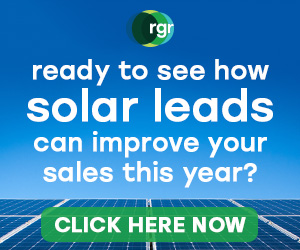
Matching the Right Solar Panel With the Right Customer Makes Selling That Much Easier
 Solar technology is constantly changing, so today’s solar panels are far different from the ones that were introduced to market just a few short years ago. It should come as no surprise that today’s panels are more efficient, last longer, and all-around better.
Solar technology is constantly changing, so today’s solar panels are far different from the ones that were introduced to market just a few short years ago. It should come as no surprise that today’s panels are more efficient, last longer, and all-around better.
But there is no one solar panel that’s a perfect fit for every homeowner out there. Customers vary, and so too do their solar needs. For this reason, being able to match the right solar panel to the right customer is essential for making your job easier. Here’s how to get a handle on doing just that.
Types of Solar Panels for Residential Use
For starters, there are three primary types of solar panels used in modern residential applications. These include thin film, monocrystalline, and polycrystalline panels. Next, we’ll take a look at each individual type to weigh the pros and cons.
Pros and Cons of Thin Film Panels
Thin film panels are manufactured by placing one or more layers of photovoltaic material onto a substrate. The material used can be either amorphous silicon, cadmium telluride, copper indium gallium selenide, or organic photovoltaic cells. Thin film panels are popular because they are affordable, visually appealing, flexible, and they aren’t as impacted by high temperatures or shade like other types of panels can be.
The most common problem with thin film panels is that they require a lot of space compared to other types of panels to generate the same amount of energy. They also degrade faster than other types of panels, so they come with shorter warranties.
Thin film solar panels are best suited for those households that are looking for an affordable option and have a lot of space to accommodate their solar systems.
Pros and Cons of Monocrystalline Solar Panels
Monocrystalline solar panels are made using monocrystalline silicon (mono-Si), which is also known as single-crystalline silicon (single-crystal-Si). These panels feature a uniform look with even coloring because the silicon used is very pure, and they’re easily identifiable due to their characteristic four-sided silicon wafers.
Monocrystalline solar panels are the most efficient because they are made from the highest quality silicon. They’re efficiency rates often reach 20% or higher, which means they require less space than other types of panels. Typically featuring 25-year warranties, this type of solar panel is also known to last the longest.
Since they are the most efficient and last the longest, monocrystalline panels are the most expensive option available. As efficient as they are, they don’t work as well in colder temperatures and an entire circuit can break down should a panel become partially covered by snow, dirt, or even shade.
Monocrystalline panels are ideal for those customers with limited space and those who look at solar as an investment and are willing to pay more for better efficiency.
Pros and Cons of Polycrystalline Solar Panels
Polycrystalline solar panels are among the first types to reach the market as far back as 1981. They are made by melting raw silicon and pouring it into square molds, which then get cut into square wafers when cooled.
This type of panel is simpler and cheaper to make than monocrystalline panels and there’s less waste in manufacturing them. While polycrystalline panels have slightly less heat tolerance than monocrystalline panels, the difference is small and not worth the extra cost of the latter in the minds of many customers.
Unlike monocrystalline panels, the silicon used to make polycrystalline panels is less pure, so the efficiency of the panels drops a little, to around 16%. It also takes a larger application of these panels to deliver the same energy output of a smaller monocrystalline system.
Polycrystalline panels are preferred by customers who like the uniform look of solar panels, have a moderate amount of space for their installation, and want to enter the solar market at a mid-point price range.
Let RGR Marketing Supply Your Solar Business With Reliable, Vetted Leads
Are your solar leads performing to your expectations? If you want better, more convertible leads, then contact RGR Marketing today. We provide our clients with high-quality, verified leads that are validated and tailored to their specific demographics and requirements. We can help you grow your solar business because our vetted leads make it easier for your team to convert sales. Give us a try today!
Start making more
money today!
Search Categories
Tags
Tag Cloud
Latest from Twitter
Contact Us
Call us at 310-540-8900 or fill out the form below and we’ll tell you how you can get high quality leads for free*.
* Get up to 10% free leads on your first order!